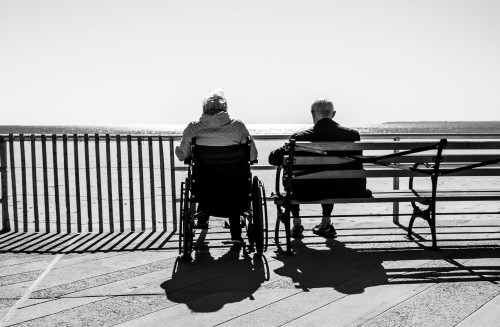Sure you know your chronological age, but expert doctors say it's possible to reverse your "biological age" with a few simple choices.
As you age, a little creak in the knee or the occasional scatter-brained moment can make you shake your head at how fast time passes. You know how many candles were on the cake for your last birthday, but the concept of biological age is a more recent perspective which expert doctors define by speaking to how certain characteristics can indicate whether your physiology is more youthful or more advanced than time alone dictates.
What’s perhaps most compelling is that biological age can be influenced by your lifestyle and environment. As one example, a study from November 2023 found that our personality traits and outlook on life play key roles in our biological aging process. The study revealed that negative characteristics, such as neuroticism, might increase the risk of dementia, while positive traits like, overall life satisfaction, could protect against cognitive decline.
What does your biological age indicate about the status of your own longevity? Leading doctors spell it out according to nine major sites of the body.
BREAKING: Diabetes Breakthrough Leaves Doctors Speechless - Try This Tonight
How to calculate your biological age
1. Here’s how your brain ages
The aging process affects the brain’s size, blood flow, and cognitive functions. Samuel Mathis, MD, assistant professor in the department of family medicine at University of Texas Medical Branch, explains that unlike other organs, the brain doesn’t regenerate neurons. This makes each neuron extremely valuable, and any damage or reduced blood flow can lead to their loss. This can manifest as a decrease in brain size and mild cognitive decline.
Factors like trauma, inadequate blood flow, unhealthy lifestyle choices such as smoking, poor diet, and excessive alcohol or drug use can exacerbate this decline. Additionally, a lack of mental stimulation and chronic stress also contribute negatively to brain health.
However, Dr. Mathis says we can improve the brain’s aging process. Some habits can counteract harmful brain-aging risks: Think quality sleep, brain exercises like puzzles and reading, improving diet, and avoiding harmful substances like tobacco and excessive alcohol. Protective measures like wearing helmets during activities such as cycling also play a crucial role.
2. Here’s how your eyes age
Natasha Bhuyan, MD, a member of the American Academy of Family Physicians and based in Phoenix, AZ, explores the inevitable changes eyes undergo with age. “As we age, our eyes go through many changes that impact our vision,” she explains, highlighting age-related conditions like cataracts, macular degeneration, and glaucoma. She notes that aging makes it more challenging to focus on close objects.
To combat these changes, she spotlights preventative measures, such as “wearing sunglasses to protect from UV radiation and avoid smoking.” Additionally, a diet abundant in vegetables—particularly dark, leafy greens—can maintain eye health.
3. Here’s how your hearing is affected by age
According to Johns Hopkins Medicine, presbycusis—a condition known as age-related hearing loss—is a common issue affecting one in three adults over 65. Often, the change in hearing is gradual, making it hard to notice at first.
If you’re experiencing hearing difficulties, your healthcare provider will examine your ears using a lighted device called an otoscope to check for any damage, blockages, or infections. They might refer you to an audiologist for further evaluation through an audiogram. To prevent age-related hearing loss, avoid loud noises and use earplugs or special fluid-filled earmuffs to prevent further damage.
4. Here’s how your heart ages
“Heart age is a way to understand your risk of a heart attack or stroke,” states Francisco Lopez-Jimenez, MD, a cardiologist at the Mayo Clinic, pointing out that factors like age, blood pressure, cholesterol levels, diet, exercise, and smoking habits determine it. A younger heart age correlates with a lower risk of heart disease.
However, Dr. Lopez-Jimenez shares, “If you’re like most Americans, your heart age is older than your actual age.” But there’s hope, as he assures, “You can lower your heart age by adopting a healthier lifestyle.” Starting with just one or two lifestyle changes can make a significant impact. Healthy measures include:
-
Quitting smoking
-
Engaging in at least 150 minutes of physical activity per week
-
Eating heart-healthy foods (vegetables, fruits, nuts, seeds, legumes, whole grains, and lean proteins, especially fish)
-
Limiting salt intake
-
Maintaining a healthy weight
-
Managing blood pressure, cholesterol, and blood sugar levels
5. Here’s how your digestive system ages
“The GI tract is a bit different than the rest of the body as it regularly replaces its cells,” explains Dr. Mathis. However, aging can still influence the GI tract, particularly affecting motility—the movement of the esophagus, intestines, and colon. “As we age, we lose some of the villi and ridges in our GI tract that help with digestion and absorption, as well as weakening of the walls of the intestines,” he notes. This weakening can lead to conditions like diverticulosis, which, if inflamed, becomes diverticulitis. Aging can also bring about other issues like constipation or diarrhea.
“The best ways to help improve our GI tract are through diet and exercise,” Dr. Mathis says. A diet rich in healthy fibers supports GI strength and reduces inflammation, while regular exercise stimulates the GI tract, maintaining its motility and strength. Additionally, quality sleep and managing stress levels can decrease the adverse effects of aging on the GI tract.
6. Here’s how the reproductive system ages
As we age, our reproductive system undergoes significant changes, explains Jessica Shepherd, MD, an OBGYN. “The changes that occur are with hormones and the decline of estrogen, progesterone, and testosterone,” she says. “There are also changes in the ligaments and tissue, which can lead to prolapse of the pelvic organs.”
Recently, scientific focus has expanded to understand how menopause impacts the body. “The lack of estrogen impacts the vaginal tissue and also the rest of the body—including the bones, heart, and brain.” While it’s not possible to lower the biological age of the reproductive system, maintaining its health is achievable.
She emphasizes the importance of regular visits to the gynecologist, along with preventative screenings like Pap and HPV tests for cervical cancer (we also suggest the HPV vaccine), and implementing healthy lifestyle habits.
7. Here’s how your joints age
Joaquin Sanchez-Sotelo, MD, a Mayo Clinic orthopedic surgeon, explains that while cartilage loss is common with aging, it doesn’t necessarily lead to joint replacement. “Loss of articular cartilage is the essence of what is called osteoarthritis,” he shares.
Fortunately Dr. Sanchez-Sotelo offers proactive measures for joint preservation. “You have to exercise within reason,” he advises, highlighting the importance of maintaining strong muscles around joints to ease their load. He also stresses the significance of a healthy weight, as obesity can strain joints. Challenging the old notion that joint pain is an inevitable aspect of aging, he emphasizes, “In the past, older people just accepted joint pain. Now, people are living longer and want to remain active as they age. We are not all destined for joint replacement. There are some people in their eighties and nineties who have great joints.”
8. Here’s how your feet age
“The ligaments and tendons that support the arch in your foot become worn from use,” says Nicole Nicolosi, DPM, a podiatrist with the Cleveland Clinic. This wear leads to a gradual arch collapse, resulting in feet that may become longer or wider. Weight gain, common in older age, further exacerbates this change by adding pressure on these supporting structures. Additionally, the fat pads cushioning the feet thin out, altering shoe fit and reducing shock absorption, which might contribute to increased foot discomfort.
Dr. Nicolosi emphasizes the importance of regular shoe fittings to accommodate these changes: “It’s important to get fitted for new shoes every so often to make sure you have a proper fit.” Regular foot health checks are also important as you age, as they can reveal conditions like diabetes or circulatory issues.
TRENDING: Viagra Obsolete: New Invention Cheaper, Safer, Faster
9. Here’s how your skin ages
It’s no secret: The aging process visibly impacts the skin, your largest organ (and your most noticeable, depending on the spot). Dr. Bhuyan explains the changes: “As we age, our skin loses its elasticity, which causes the appearance of sagging or wrinkles.”
To respond to these signs of aging, she emphasizes the importance of sun protection. “The key to preventing skin aging is to protect your skin from the sun by wearing sunscreen or any sun protection, like hats or long sleeves,” she advises. Additionally, staying hydrated and using retinol can maintain younger-looking skin.
How to lower your biological age
The journey to lower biological age is marked by consistency and gradual change across all body systems. Embracing one positive lifestyle change at a time can replace older, less healthy habits with new, beneficial ones. The focus should be on nurturing your body with nutritious food, engaging in regular physical activity, prioritizing quality sleep, and fostering healthy relationships with others.
On centenarians, Dr. Mathis says, “They have a few things in common: One of those things is a balanced and healthy plant-based diet.” He also notes the significant impact of sleep quality: “People who have high-quality sleep are almost 20% less likely to die from things like heart disease or cancer.” This high-quality sleep encompasses over seven hours per night, ease in falling and staying asleep, independence from sleep medications, and waking up feeling rejuvenated. Such sleep patterns have been linked with increased life expectancy by two to five years for some individuals.









